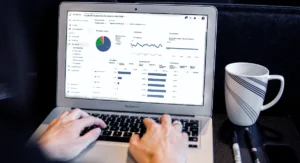Think about what a well-written, well-designed, well-optimized website is capable of:
- It can generate sales leads for your sales team 24/7/365
- It can keep customers or potential customers up to date on what’s happening with your company
- It can spread your brand and enhance your word-of-mouth presence offline
- It can open up feedback from your customers that you can use to improve your product or service line
- It can give you some very direct and immediate information on its performance, in the form of web analytics, letting you tweak as necessary

All this and more, as the TV ads used to say.
Websites as Marketing Department
Your website can do so much for your company’s overall image and brand. And we’re not just talking about a sexy-looking, well-laid-out website with plenty of Flash animation and nice-looking graphics. A good website with persuasive, well-written copy and architecture that’s laid out so that no page is more than three clicks away is only half the story. You need a website that’s optimized and SEO‘d within an inch of its life so it shows up at or near the top of search engine results. If your company sells pasta or pasta-making equipment, you want all the proper keywords in play – not just “pasta,” but also “linguini,” “angel hair,” “ziti,” “lasagna,” “noodles” and “macaroni.” If someone’s looking for pasta, you want to be the one that they turn to, and the best way to ensure that is to have your page up towards the top of Google results whenever people are searching.
It’s hard to overemphasize the importance of SEO when it comes to web design and copywriting. Google and the other search engines have a list of over 200 criteria that they use to determine page rank and relevance for any website. They are famously cagey about the 200-odd criteria (you could even say that it’s an industry secret) since they don’t want unscrupulous webmasters gaming the system and getting unfair page rank for their sites. SEO experts do, however, have on-page and off-page methods for getting that all-important page rank. And if your page rank and visibility goes up, you can figure on it serving you in other ways offline and in the real world, in the form of positive word of mouth and referrals.
Website as Salesperson
This isn’t too hard to figure out. If you’re a small company without a sales department, a well-designed website with an easy-to-use, secure shopping cart feature can be all the sales department you need. This part of Internet marketing has evolved to the point where a brick-and-mortar store is redundant and unnecessary for many retailers.
If you’ve still got salesmen in the field, your website can give all the information about prices, product lines, services, features, etc. that your customers need. Consider the website as a way to qualify and soften up potential clients or customers before a sales call.
Websites and Feedback
There are all kinds of great ways for you to hear back from your customers via a website. Consider things like live chat customer support, a forum, a Q and A section or a comments section on your website. Not only can that give you the kind of feedback you need to fine-tune your efforts, but it can give you the fresh content that search engines love to see. And don’t let a bad review or comment scare you off – consider it one more way to tweak your products and services for the demographic of buyers you’re courting. And as for a good customer review or comment…your website needs glowing customer testimonials, doesn’t it?
This particular aspect of websites’ roles in ecommerce has been refined into a sub-science called Online Reputation Management. Online reputation management can even be parlayed into getting your company better search engine results (although this tends to all get a little nebulous). But there’s one sure way to get great feedback and positive reviews form customers, and that is to offer GREAT products and services, and do business in a professional, friendly, even-handed, timely way. That, of course, is ultimately up to you. Don’t just presume that because you have a very powerful brand presence that you can afford to just sit on your hands and wait for things to fall together. In this business climate, it’s up to you to manage your brand and reputation and keep your company up front.
Website as Sales Brochure
This is the kind of thing that used to be done strictly with dead trees.
Now your site can tell your customers everything they need to know about your products and services. Prices, sizes, colors, features, everything. This sort of information is one of the most valuable (and prosaic) things your website can do for you, and it’s one of the things you absolutely should not neglect in your web design and SEO efforts.
Websites and ROI
Here we touch on one of the chief advantages of websites as marketing tools. If you’re using conventional, old-media marketing methods, the measure of results can be pretty slippery. If it’s radio or TV, you’re going to be relying on Nielsen or Arbitron numbers that will hopefully give you an idea of how many listeners are hearing or seeing your ads. ANd hopefully those ratings numbers will also be narrowed down by demographic boundaries as well. Of course, that doesn’t account for how many viewers are reflexively hitting the “mute” button on their remote controls every time there’s a commercial break, or how many people are mentally tuning you out, or how many people are DVR’ing a program for the express purpose of being able to FF through commercial breaks. Newspaper ads are based on placement, size of the ad, frequency of the ad campaign and readership, all of which are even more loosey-goosey numbers.
Website marketing campaigns have none of these drawbacks.
Anybody who lands on your website is there because he or she was specifically looking for it. That by itself is a huge advantage; your potential customers are active participants rather than passive ones who are just being exposed to an ad. Whether they get to your site through a link from another site, a pay per click ad or a search engine results page, they made the conscious decision to land there.
Now the other great advantage of modern websites: whether you’re using pay per click ads, search engine results or whatever other method, you have the results at your disposal. Web analytics can track page hits, return visits, duration on each page, hits on each page and a number of other metrics, all of which are available to you almost right away. That sort of immediacy (rather than waiting til the end of the month or even the end of a quarter) can give you the flexibility you need, to tweak your website, your copy or your SEO efforts to make the most out of your site and your web presence. And that kind of knowledge can be interpreted and analyzed to give you a good idea of your return on investment for a website. Hint: It’s almost always going to be better than the ROI for costly TV, radio and print spots!
The Upshot?
Your website may not replace your employees…let’s not get ahead of ourselves here!
But your website can be your most valuable resource when it comes to augmenting and backing up the efforts of your employees. That’s why it needs such careful consideration, management and maintenance so that it can really and truly work for you.
